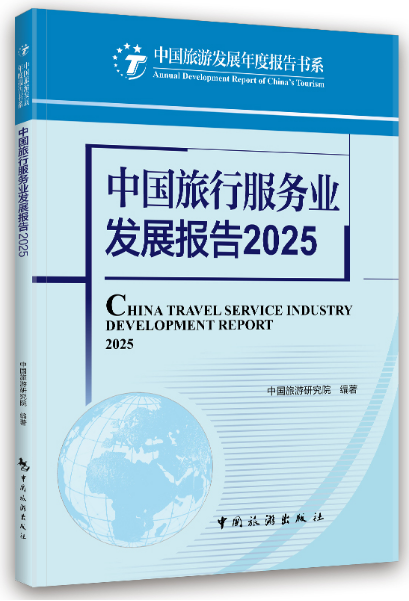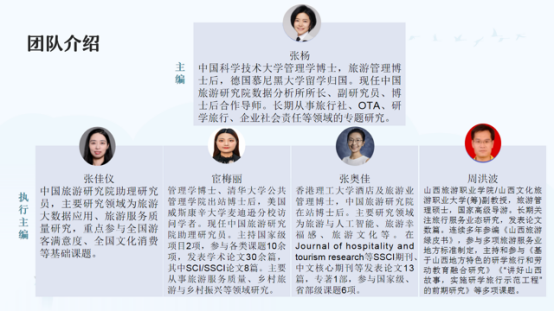On March 26, our institute hosted the "Annual Landmark Achievements Release Conference of China Tourism Research Institute", and released a total of 8 landmark research results. The "China Travel Service Industry Development Report 2025" is edited by Zhang Yang, director of the Data Analysis Institute, and is a scientific research result that condenses the wisdom of the entire travel service research team. Dr. Huan Meili from the Data Analysis Institute released it on behalf of the research team.

The report points out that after the market recovery in 2023, travel service providers will usher in a year of accelerated performance recovery in 2024, and also a year of performance differentiation. This differentiation is mainly reflected in three aspects: first, the performance differentiation between platforms and offline companies, and between leading and non-leading companies is more obvious; second, offline channels are still important, and the market segments show a better growth trend; third, destination administrative entities play a more important role in the field of travel services.
1. Offline travel service providers (I) Overall challenges and opportunities in the industry
2024 is the second year of full recovery of travel business, and the tourism industry as a whole has entered a new era of prosperity and development. As of June 30, 2024, the total number of travel agencies in China reached 60,833, a year-on-year increase of 19.80% and an increase of 8.10% compared with the end of 2023. However, although travel agencies have achieved full recovery in the three major markets of domestic tourism, inbound tourism and outbound tourism, there is still a large gap compared with 2019. The recovery of inbound and outbound tourism business is relatively slow, and travel agencies still face many challenges in supply chain integration, product innovation, and service quality improvement.
2. Characteristics of the development of the travel agency industry
First, the degree of specialization has been continuously improved. Travel agencies have achieved a significant improvement in their degree of specialization by continuously expanding their business segments, improving professional skills, and exploring scientific management models.
The second is to enable destination gameplay and service innovation. The cooperation between travel agencies and tourist destinations is becoming increasingly close, forming a virtuous interaction. Travel agencies have brought more tourist traffic and economic benefits to destinations by innovating tourism products and services; and destinations have provided strong support for travel agencies' product innovation by providing high-quality tourism resources and services.
Third, the industry governance is more comprehensive and systematic. The cultural and tourism authorities have strengthened the governance of the travel agency industry through multiple industry supervision methods such as special rectification, node reminders, key inspections, and grade assessment. At the same time, the innovative development and transformation and upgrading of travel agencies have been promoted through measures such as publishing typical cases, implementing special policies, and reward and subsidy policies.
Fourth, all parties worked together to promote the continued improvement of inbound tourism. The continuously released policy dividends once again gave wings to the development of inbound tourism. At the same time, the central and local governments continued to increase the intensity of online and offline marketing activities.
Fifth, inbound and outbound businesses are leveraging each other and developing across sectors. The boundaries between inbound and outbound tourism are being broken, and cross-sector development has become a new trend in industry reform. Inbound tourism service providers are expanding their outbound tourism business, providing domestic tourists with more diverse outbound travel options.
3. Path to high-quality development of the travel agency industry
First, focus on demand and innovate product and service design. Deeply understand the needs of tourists and develop personalized and diversified tourism products and services to meet the needs of different customer groups.
Second, we will improve both internally and externally, and optimize the business environment and consumption scenarios. We will strengthen internal management and improve operational efficiency; at the same time, we will improve the tourist experience by optimizing tourism consumption scenarios.
The third is to strengthen talent development and stimulate the endogenous momentum of the enterprise. We will strengthen talent training and introduction, improve the professional quality and service level of employees, and provide strong talent support for the development of the enterprise.
Fourth, empower with standards and build a service standard system. Formulate and improve travel agency service standards to enhance service quality and industry competitiveness.
Fifth, innovate technology applications and promote service quality improvement through digital upgrades. Actively apply new technologies such as big data and artificial intelligence to improve the service quality and operational efficiency of travel agencies.
II. Online travel service providers (I) leveraging the booming market to achieve rapid growth in performance
In 2024, the online travel industry will continue to maintain performance growth under the favorable situation of continued expansion of tourism demand, autonomous and personalized travel, and rapid recovery of inbound and outbound travel. The leading online travel companies will be the first to recover, and stand out in the market competition with their strong technical advantages and resource integration capabilities. For example, companies such as Ctrip Group, Tongcheng Travel, Fliggy Travel, and Meituan have achieved rapid growth in performance by continuously optimizing products and services and improving user experience.
2. Actively embrace artificial intelligence
From trial to large-scale application, online travel has actively embraced artificial intelligence. By introducing artificial intelligence technology, online travel companies have realized functions such as intelligent customer service, intelligent recommendations, and intelligent itinerary planning, improving service efficiency and user experience.
3. User-centric, continuous service expansion
The content innovation and service upgrades in the online travel industry have never slowed down, and the industry's internal competition has continued. Companies have focused on users and continuously improved service quality. By optimizing the user interface, providing a more convenient booking process, and launching more preferential activities, they attract users to choose their own platforms. Head companies such as Fliggy, Ctrip, and Alipay rely on their platform advantages to help the recovery of the inbound and outbound markets.
(IV) Going offline, the market penetration is more determined
As market competition intensifies, online travel companies have turned their attention to the offline market and expanded their offline business channels by cooperating with offline travel agencies, scenic spots, hotels, etc. At the same time, some online travel companies have also expanded their business to second- and third-tier cities and rural areas by sinking the market to tap more market potential.
5. Future Challenges
First, customer acquisition channels continue to face challenges. With the intensification of market competition, customer acquisition costs continue to rise, and customer acquisition channels are also facing more uncertainties.
Second, there are still many problems with supply and demand services. The imbalance between supply and demand in the tourism market still exists. Some popular tourist destinations are in short supply during the peak tourist season, while some unpopular areas are facing a shortage of tourists.
Third, there is still a long way to go in technological innovation. Although new technologies such as artificial intelligence have been widely used in the online travel industry, technological innovation still needs to be continuously promoted to meet the growing needs of users.
III. Travel services from the perspective of destinations (I) Improving public transportation services for tourism and promoting the integrated development of transportation and tourism
The improvement of tourism public transportation services is an important foundation for promoting the development of the travel service industry. Various localities have achieved an organic combination of transportation and tourism by creating a variety of transportation and tourism integration models, including water tourism integration, rail tourism integration, public tourism integration, air tourism integration, and postal tourism integration.
2. Vigorously promote innovation in tourism content
Tourism content innovation is an important means to enhance the attractiveness of the travel service industry. Various places have promoted the in-depth integration and development of culture and tourism, and continuously enriched tourism products and service content. For example, Quanzhou, Fujian, has promoted the in-depth integration and development of culture and tourism through the popularity of hairpin flower activities; Shenyang, Liaoning, has ignited the ice and snow season by launching more than 300 special activities to help the development of the ice and snow economy; Xiangshan, Zhejiang, has created a new consumption scene for coastal tourism and built a marine sports brand based on sports events. Various places have created iconic cultural and tourism IPs, such as "Shuangshuang Guiyang", and Qiandongnan's "village"-themed village super and village BA, etc., to enhance the image and popularity of the destination. At the same time, various places have promoted the high-quality development of smart tourism by using digital technology.
3. Promoting reform and innovation of systems and mechanisms
Institutional reform and innovation are the driving force for the development of the travel service industry. Taking Guizhou as an example, by building and improving the system and mechanism for the integration of all formats, the efficiency of resource utilization is improved; the system and mechanism for all media communication is built and improved to enhance the ability to expand customer sources; the system and mechanism for shaping all time and space is built and improved to optimize the tourism service system.
(IV) New quality productivity promotes high-quality development of the cultural tourism industry
New productivity is an important support for the high-quality development of the travel service industry. Digital technology empowers and innovates cultural and tourism consumption scenarios. The integrated application of information technology promotes the development of smart tourism in creative cities. At the same time, digitalization promotes the development of inbound tourism. For example, the "Full AI Companion Tour" service launched by the Huangshan Municipal Government in cooperation with Alipay provides tourists with a more convenient and intelligent travel experience.
5. Strengthening innovation and implementation of cultural tourism policies
The innovation and implementation of cultural tourism policies are important guarantees for the high-quality development of the travel service industry. First, we will introduce consumption policies to boost cultural tourism consumption; second, we will optimize service quality and management and conduct tourist satisfaction monitoring; third, we will strengthen inbound tourism policies and improve the convenience of inbound tourism; and fourth, we will strengthen the construction of infrastructure for tourism safety.

Contributor | "China Travel Service Industry Development Report 2025" Research Group Editor | Liu Xin Source | China Tourism Academy (Data Center of the Ministry of Culture and Tourism) Please indicate the source for reprinting